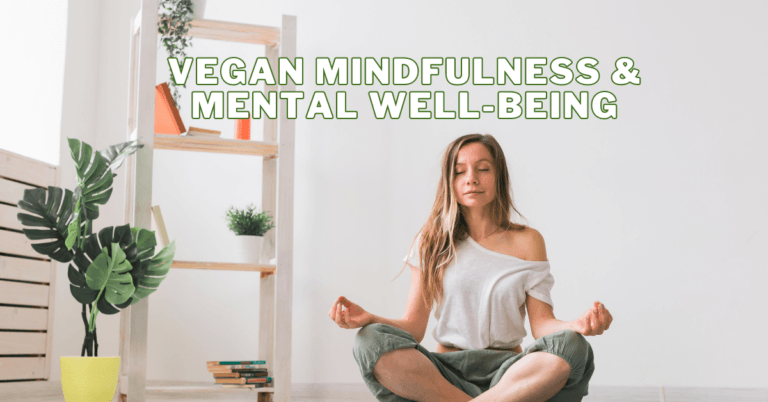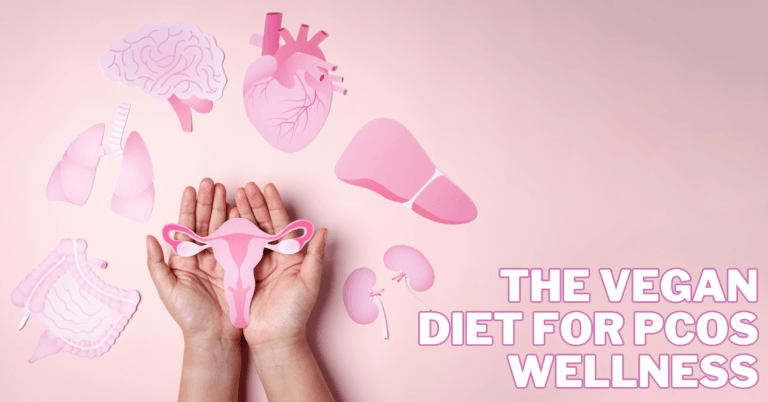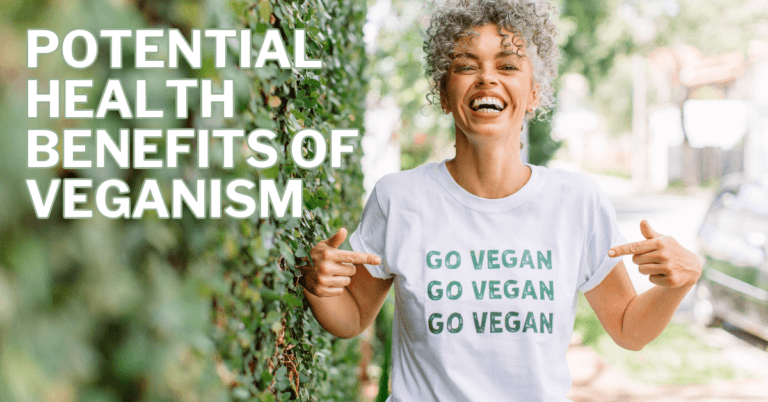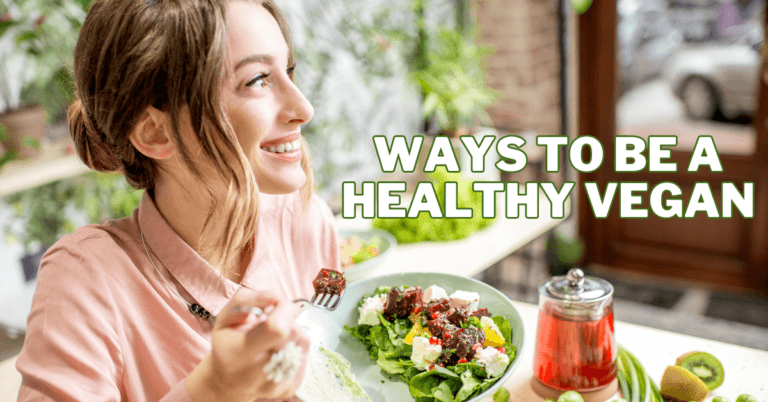How To Be Healthy As A Vegan
How To Be Healthy As A Vegan
Amidst the buzz surrounding this dietary revolution, one question remains: How can a vegan be healthy?
In a world where health-conscious choices are becoming increasingly prevalent, the rise of veganism stands out as a beacon of both ethical and nutritional enlightenment.
Veganism has gained popularity among people looking for a more all-encompassing approach to health because of its emphasis on animal compassion, environmental sustainability, and individual vitality.
Embracing a vegan lifestyle encompasses a commitment to abstain from consuming all animal products, from meat and dairy to eggs and honey.
While this dietary choice undoubtedly offers many benefits, ensuring optimal health as a vegan requires meticulous attention to nutrition.
This article will explore the key strategies and practical tips on “How to Be Healthy as a Vegan.” From understanding the health benefits of a plant-based diet to crafting a balanced meal plan and incorporating lifestyle practices that support vitality, we will provide comprehensive guidance to help you thrive on your journey toward optimal health as a vegan.
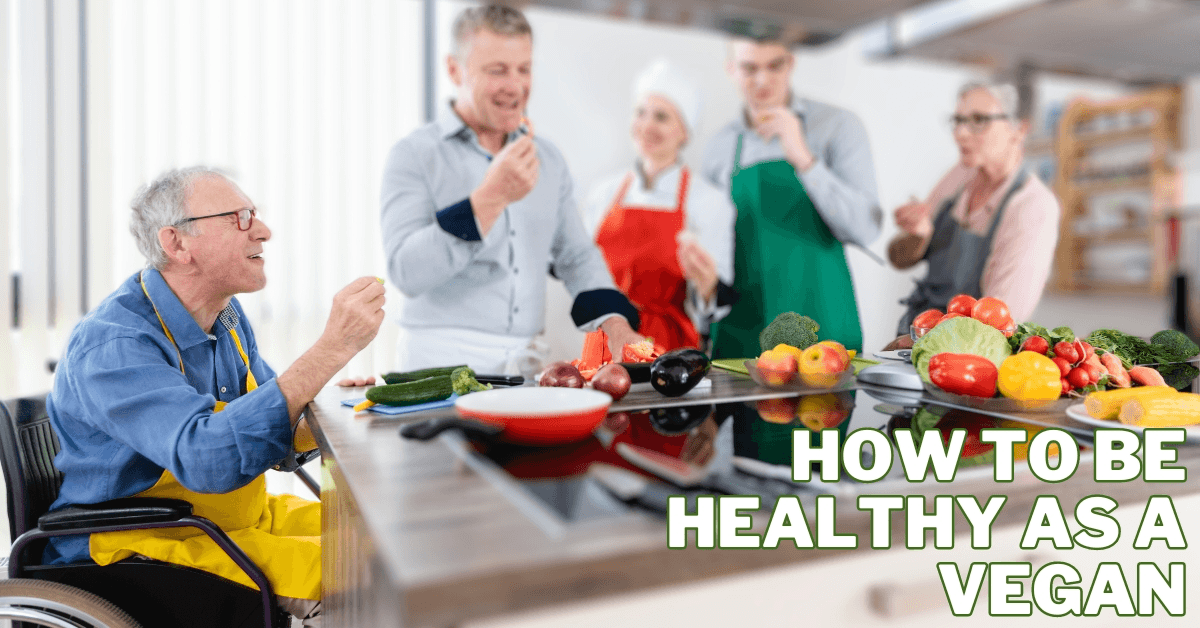
Health Benefits Of Going Vegan
Studies have shown that individuals who adhere to C-type hypertension and type 2 diabetes are compared to their omnivorous counterparts.
A plant-based diet abundant in fruits, vegetables, whole grains, and legumes is naturally rich in fiber, vitamins, minerals, and antioxidants, which support overall well-being.
Join us as we uncover the keys to unlocking vibrant health and vitality on the journey of “How to Be Healthy as a Vegan.”
Here are some of the key health benefits of going vegan:
1. Improved Heart Health
First and foremost, turning vegan lowers your risk of heart disease and stroke since studies regularly demonstrate that vegans typically have lower blood pressure and cholesterol levels.
The absence of dietary cholesterol in animal products and the high fiber content of plant-based diets contribute to improved cardiovascular health.
2. Lower Risk Of Chronic Diseases
Studies suggest that adopting a vegan diet can lower the risk of developing chronic diseases such as type 2 diabetes, certain cancers (such as colon, breast, and prostate cancers), and hypertension.
The abundance of antioxidants, phytonutrients, and fiber in plant-based foods helps combat inflammation and oxidative stress, key factors in developing these diseases. This is the second health benefit of going vegan.
3. Weight Management
Diets based mostly on plants typically include more fibre and nutrient-dense meals while consuming fewer calories and saturated fats.
Thus, a vegan diet frequently results in weight loss or improved weight control, which enhances general health and lowers the risk of obesity-related disorders.
4. Improved Digestive Health
A diet rich in fruits, vegetables, whole grains, and legumes provides ample fiber, which promotes healthy digestion and regular bowel movements.
Fiber also supports the growth of beneficial gut bacteria, contributing to a balanced microbiome and reduced risk of gastrointestinal disorders, another health benefit of going vegan.
5. Enhanced Nutrient Intake
Contrary to popular belief, a well-planned vegan diet may give the body all the necessary vital elements. By focusing on various plant-based foods, vegans can easily meet their daily requirements for vitamins, minerals, and antioxidants, including vitamins C, E, potassium, magnesium, and folate.
6. Improved Energy Levels
Many say switching to a vegan diet has given them more energy and vitality. Complex carbohydrates in plant-based diets give you steady energy levels all day without the energy dips of processed or high-fat foods.
7. Reduced Inflammation
Plant-centered diets possess inherent anti-inflammatory properties due to their abundant antioxidants and phytonutrients.
Asthma, autoimmune disorders, and other inflammatory diseases may have their symptoms lessened by veganism since it reduces inflammation.
8. Ethical And Environmental Benefits
While not directly related to individual health, veganism's ethical and environmental benefits contribute to overall well-being.
By refraining from consuming animal products, vegans reduce greenhouse gas emissions, deforestation, and water pollution linked to animal agriculture. They also support animal welfare efforts.
How To Have A Healthy Vegan Diet
Crafting a healthy vegan diet involves carefully planning to meet your nutritional needs while enjoying various delicious and satisfying plant-based foods.
Here are some key strategies for maintaining a balanced and nutritious vegan diet:
1. Focus On Whole Foods
Focus on complete, minimally processed plant foods such as fruits, vegetables, whole grains, legumes, nuts, and seeds.
These foods' abundant fiber, antioxidant, and vitamin content benefit overall health and wellness.
2. Get Adequate Protein
While plant-based protein sources may differ from animal products, they can easily meet your protein needs when consumed in sufficient quantities. Foods high in protein, such as beans, quinoa, almonds, seeds, seitan, tofu, and chickpeas, should be included.
3. Incorporate A Variety Of Foods
To guarantee you obtain a broad spectrum of nutrients, try incorporating a variety of fruits, vegetables, grains, legumes, nuts, and seeds into your diet. Experiment with different flavours, textures, and cooking techniques to keep your meals interesting and fulfilling.
4. Don't Skimp On Healthy Fats
Include healthy fats, such as avocados, nuts, seeds, and plant oils like olive and coconut oil. These lipids are necessary for hormone synthesis, nutrition absorption, and brain function.
5. Pay Attention To Calcium
Calcium is important for bone health, and while dairy products are not consumed on a vegan diet, plenty of plant-based sources of calcium are available.
Include fortified plant milk, calcium-set tofu, leafy greens (like kale, collard greens, and bok choy), almonds, and sesame seeds.
6. Remember Vitamin B12
Vegans must ensure they get enough vitamin B12 through fortified foods or supplements, as it is mostly found in animal sources.
Consider taking a B12 vitamin or look for fortified plant milk, nutritional yeast, and breakfast cereals.
7. Include Omega-3 Fatty Acids
Omega-3 fatty acids benefit the heart and brain. Regularly include plant-based sources of omega-3s in your diet, such as walnuts, chia, hemp, and flaxseeds, as well as algae-based supplements.
8. Stay Hydrated
Drink plenty of water daily to stay hydrated and support optimal bodily functions. Herbal teas, infused water, and coconut water are great options for mixing up your hydration routine.
9. Plan
Take the time to plan your meals and snacks to ensure you have various nutritious options on hand. Preparing meals in advance, batch cooking, and stocking healthy snacks can help you stay on track with your vegan diet.
10. Listen To Your Body
Find out how eating certain foods affects your mood and modify your diet. Everyone's nutritional needs are unique, so listening to your body and making choices that support your health and well-being is important.
How To Be Healthy As A Vegan
Transitioning to a vegan diet undoubtedly offers numerous benefits. However, ensuring optimal health requires careful attention and consideration of essential nutritional aspects.
Beyond dietary considerations, maintaining overall health as a vegan involves several lifestyle practices. Join us on an exciting quest as we unveil the secrets to achieving boundless health and vitality in “How to Be Healthy as a Vegan.”
Whether you're a seasoned enthusiast of plant-powered living or an adventurous newcomer, get ready to embark on a thrilling journey toward rejuvenating your body, mind, and soul.
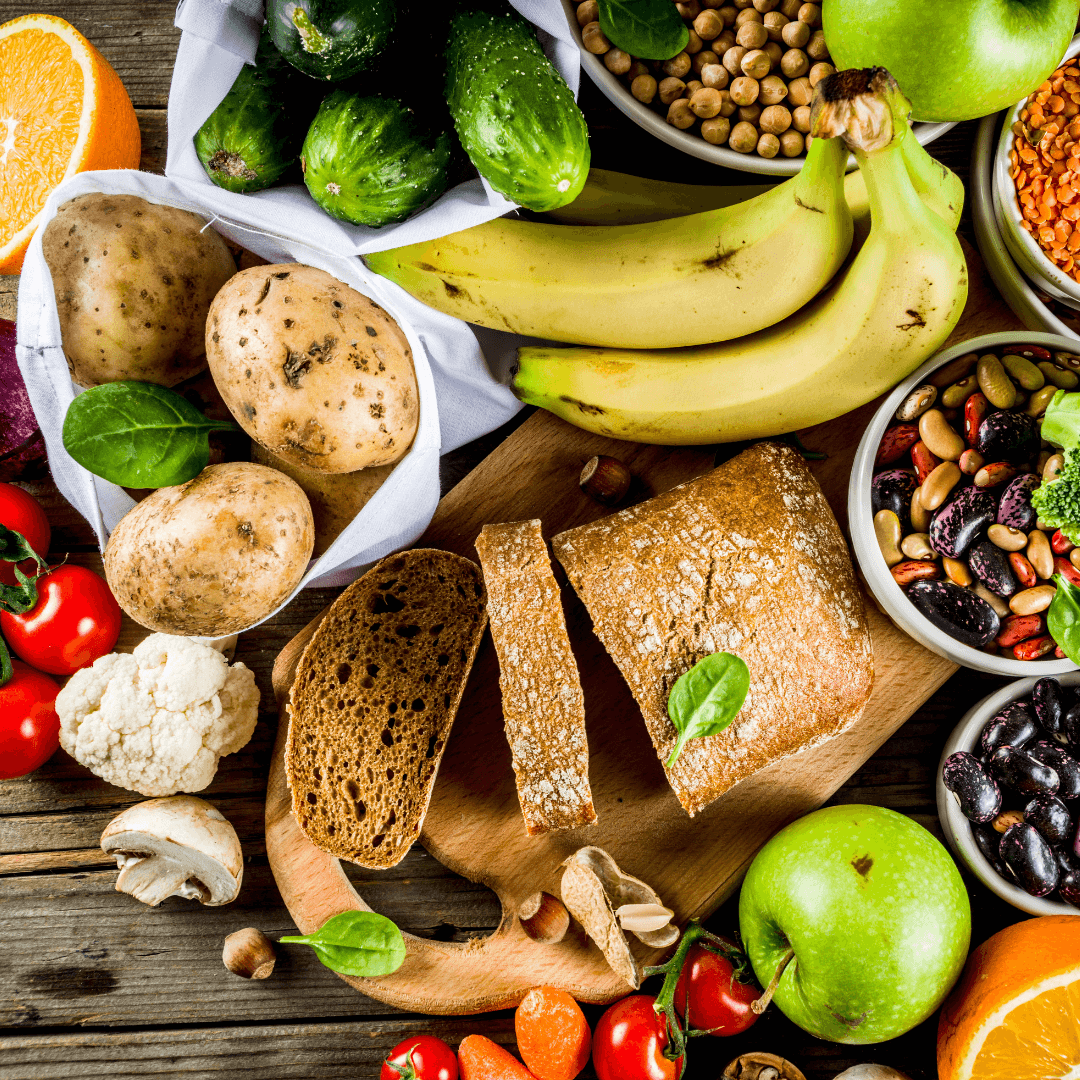
1. Prioritize Nutrient-Rich Foods
Consciously making nutrient-dense plant-based meal choices is a key component of vegan wellness. These foods are high in vital vitamins, minerals, antioxidants, and fibre—all important for maintaining several body systems and enhancing general health.
For example, fruits and vegetables are a great source of minerals like potassium, magnesium, folate, and vitamins like C, A, and other B vitamins.
They also contain many antioxidants, which help protect cells from damage caused by harmful molecules called free radicals.
Whole grains are great sources of fiber, complex carbs, and important nutrients like iron and B vitamins.
Examples of whole grains include quinoa, brown rice, and oats. Beans, lentils, and chickpeas are legumes high in fiber, protein, and minerals like zinc and iron.
Nuts and seeds offer a concentrated source of healthy fats, protein, fiber, vitamins and minerals. They also provide essential omega-3 and omega-6 fatty acids, which benefit heart health, brain function, and inflammation regulation.
By prioritizing these nutrient-dense plant foods and incorporating a wide variety of them into your meals, you can ensure that your vegan diet is well-balanced and provides all the essential nutrients your body needs to thrive.
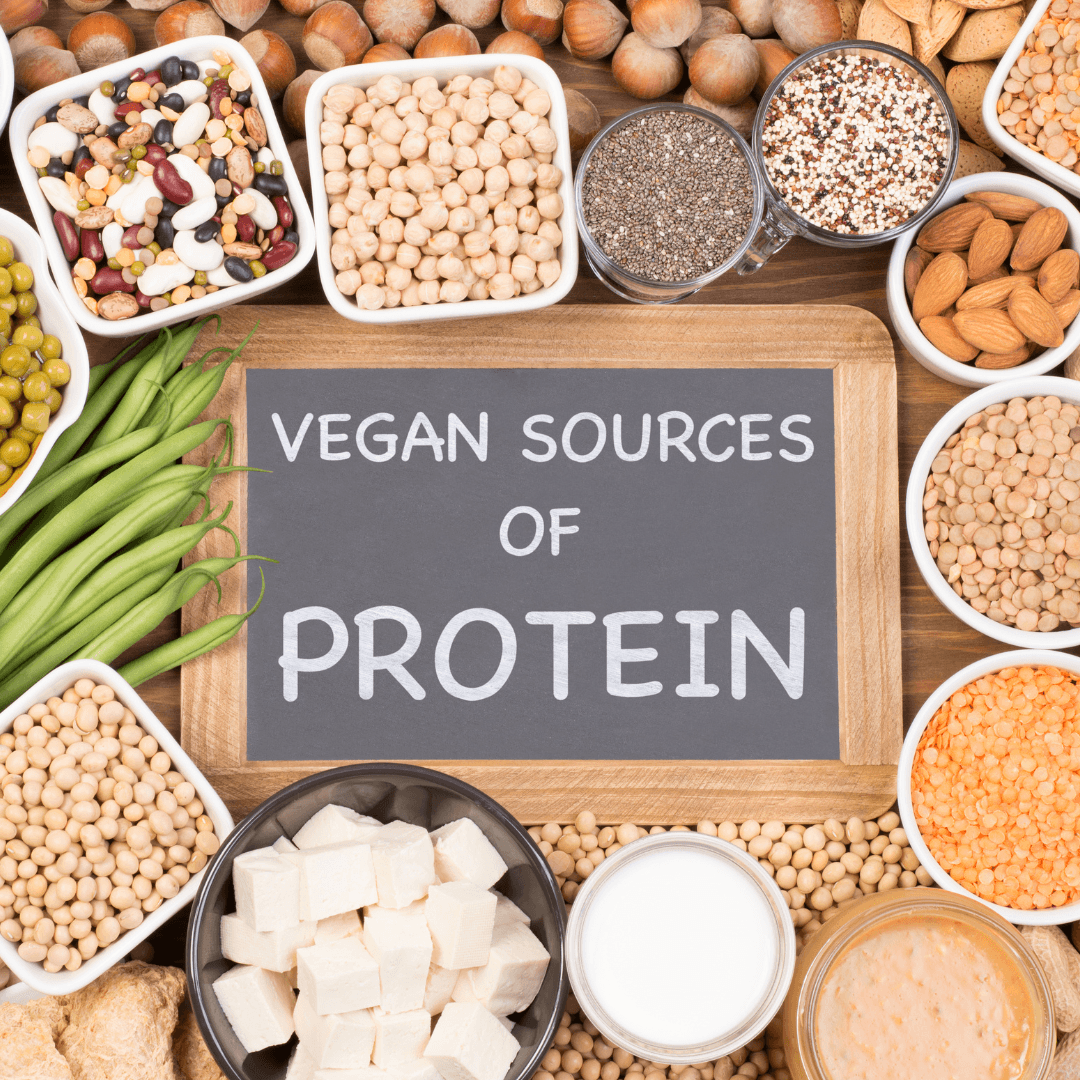
2. Ensure Adequate Protein Intake
As we delve further into How to Be Healthy as A Vegan, we see that the second step involves ensuring sufficient protein intake.
Protein is a fundamental nutrient essential for many bodily functions, including tissue building and repair, immune system support, and muscle mass maintenance.
Despite prevailing misconceptions, meeting your protein requirements on a vegan diet is entirely achievable.
You can ensure optimal protein intake by incorporating various protein-rich plant-based sources into your meals.
Tofu, tempeh, and seitan are versatile plant-based proteins that serve as excellent meat substitutes, offering ample protein and other essential nutrients.
Lentils and chickpeas are legume powerhouses. They are rich in protein and provide fiber, vitamins, and minerals necessary for overall health.
With all nine essential amino acids included, quinoa is a complete protein and a great addition to vegan dishes.
Another high-protein choice that enhances the texture and flavour of food is edamame or immature soybeans.
Combining several plant-based protein sources throughout the day maximizes protein intake and ensures a balanced amino acid profile.
This strategy guarantees all the essential amino acids for optimum health and well-being.
By incorporating these protein-rich foods into your vegan diet, you can confidently meet your protein needs while enjoying a diverse and nutritious array of plant-based meals.
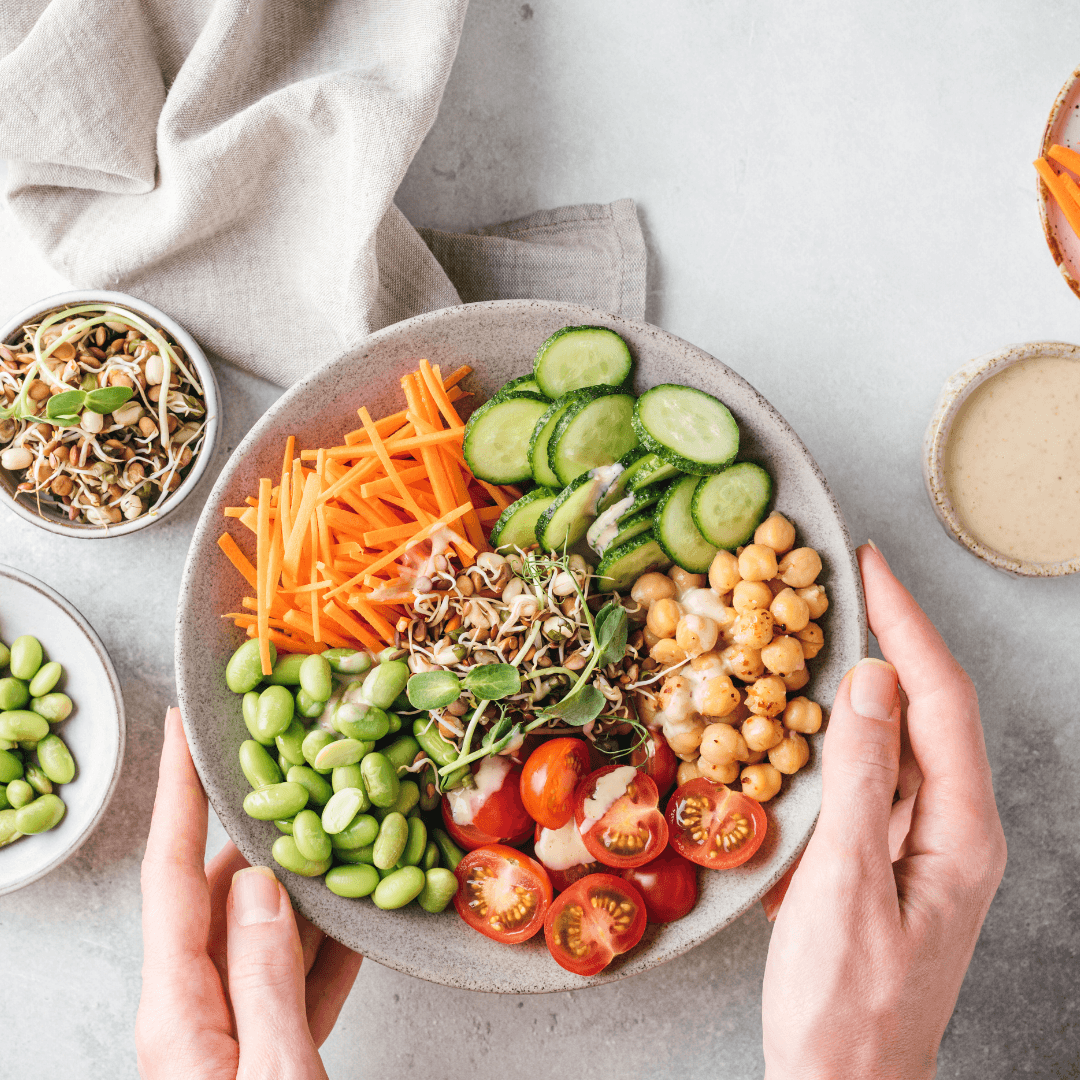
3. Pay Attention To Essential Nutrients
While delving into how to be healthy as a vegan, paying attention to essential nutrients is crucial.
While a well-planned vegan diet can be nutritionally adequate, some key nutrients may require special attention. These include:
Vitamin B12
Since vitamin B12 is predominantly found in animal products, vegans should be mindful of their intake. Vegans should consider taking a B12 supplement or consuming fortified foods such as plant-based milk, breakfast cereals, or nutritional yeast.
Regularly consuming these fortified foods or supplements can help maintain adequate B12 levels and prevent deficiency-related health issues.
Omega-3 Fatty Acids
Incorporating plant-based sources of omega-3s into the diet is essential for supporting heart and brain health.
Omega-3 fatty acids are abundant in flaxseeds, chia seeds, hemp seeds, walnuts, and algae-based supplements.
Including these foods regularly can help ensure an adequate intake of these beneficial fats and promote overall well-being.
Calcium
A vegan diet excludes dairy products, yet preserving bone health requires enough calcium.
Fortified plant milk, calcium-set tofu, and leafy greens, including bok choy, collard greens, kale, almonds, and sesame seeds, are examples of plant-based calcium sources.
Incorporating these calcium-rich foods into the diet can help meet daily requirements and support bone strength.
Iron
Plant-based sources of iron are abundant and include beans, lentils, tofu, spinach, fortified cereals, and pumpkin seeds.
It's crucial to remember that iron from plant foods—also known as non-heme iron—might not be absorbed as quickly as iron from animal sources.
To enhance iron absorption, consuming vitamin C-rich and iron-rich foods is recommended.
Pairing foods like bell peppers, citrus fruits, or tomatoes with iron-containing meals can optimize iron absorption and prevent deficiency.
4. Stay Hydrated
While examining the specifics of being healthy as a vegan, proper hydration is fundamental for maintaining overall health and vitality.
Water is vital for the body's myriad functions, from digestion and nutrient absorption to detoxification.
To guarantee proper hydration levels and support these vital functions, make it a goal to consume a lot of water throughout the day.
Water aids in the breakdown of food and facilitates its passage through the digestive tract, making hydration essential for proper digestion and additionally, staying hydrated aids in absorbing nutrients from food, allowing the body to utilize essential vitamins, minerals, and other compounds effectively.
Furthermore, proper hydration supports the body's natural detoxification processes by facilitating the removal of waste products and toxins through urine and sweat.
Drinking enough water can help flush out harmful substances from the body, promoting overall well-being.
Drinking enough water each day is essential to preserving good health. To replace fluids lost through sweat, consciously drink water frequently throughout the day, particularly before, during, and after physical activity.
Making hydration a priority supports physiological processes, energy, mental clarity, and general vitality.
5. Practice Balanced Eating
While learning the nuances of being a health-conscious vegan, achieving balance and variety in your meals is critical for optimal nutrition and general well-being.
To maintain satiety and support energy levels, include a range of macronutrients in your meals, such as protein, carbohydrates, and healthy fats.
You may increase your intake of antioxidants, vitamins, and minerals that support health and vitality by including colourful fruits and vegetables.
Cooking methods such as roasting, steaming, or sautéing can enhance the taste and texture of your food while preserving its nutritional value.
Incorporating herbs and spices improves food's flavour and nutritional value. Strong anti-inflammatory and antioxidant qualities in various herbs and spices, including cinnamon, ginger, and turmeric, improve general health.
Try experimenting with different ingredients and cooking techniques to make delicious, nutritional meals that improve your health and well-being.
Strive for balance and variety in your meals. Take advantage of the chance to try new flavours and recipes, and relish giving your body what it needs.
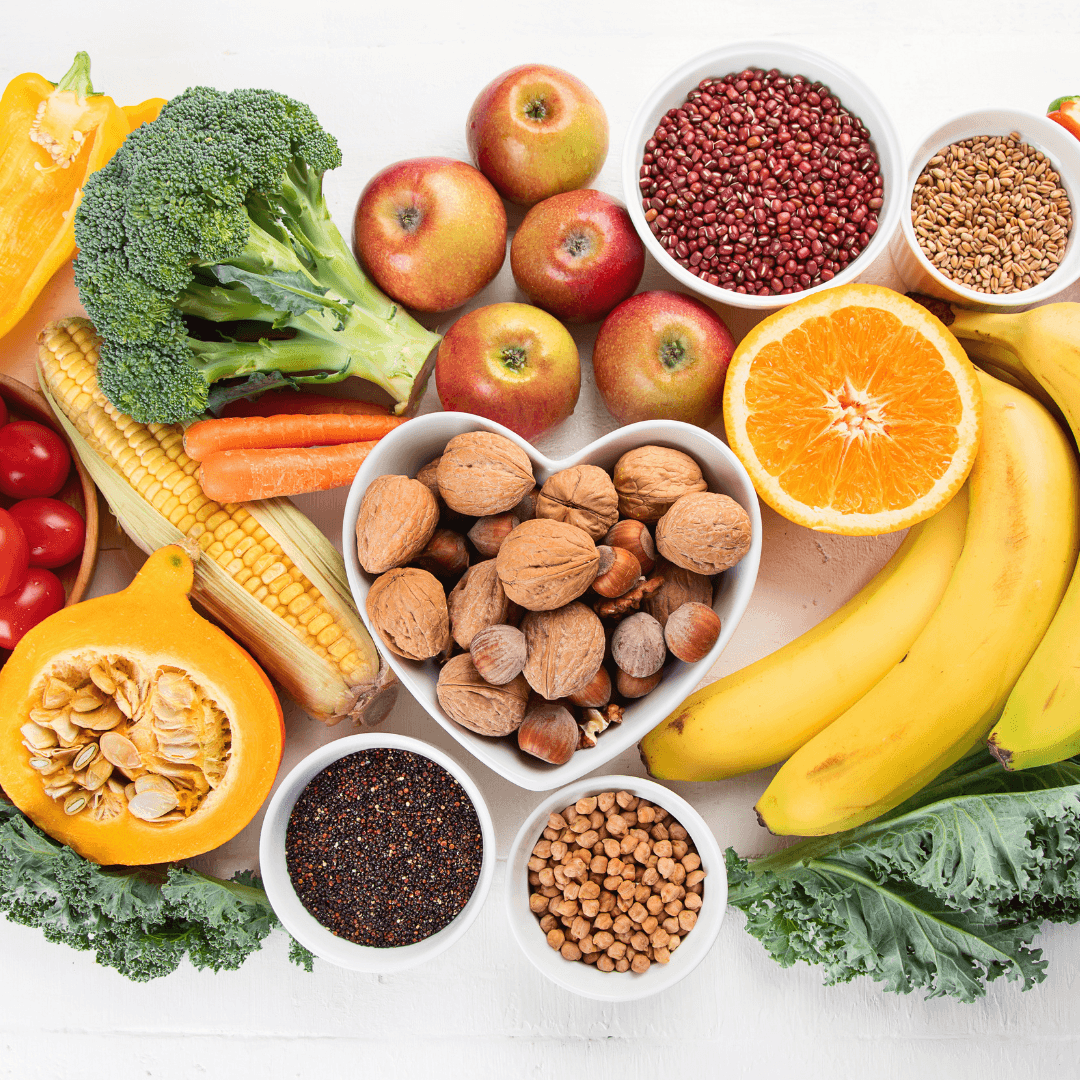
6. Embrace Whole Foods
Given our current discussion on how to be healthy as a vegan, it's essential to underscore the importance of minimizing the consumption of processed and refined foods.
Instead, prioritize whole, minimally processed plant-based options whenever possible. Whole foods help to preserve digestive health and satiety by retaining their natural fiber and minerals.
Processed and refined foods often lack essential nutrients and contain added sugars, unhealthy fats, and artificial additives that can negatively impact your health.
Picking entire foods gives your body the nutrition it needs to flourish. These include fruits, vegetables, whole grains, legumes, nuts, and seeds.
Vitamins, minerals, antioxidants, and dietary fiber—all essential for general health and well-being—are abundant in whole foods.
They can lower cholesterol, help regulate blood sugar, and reduce the risk of developing long-term conditions like diabetes, heart disease, and some cancers.
Increasing the amount of whole foods you eat improves your physical health, energy, vitality, and mental clarity.
Load your plate with vibrant fruits and vegetables, nutritious grains like brown rice and quinoa, and high-protein legumes like lentils and beans.
7. Supplement Wisely
Apart from vitamin B12, D, and iodine, certain nutrients, including iron, calcium, zinc, and omega-3 fatty acids, may also need to be supplemented based on personal dietary habits and overall health.
Speaking with a medical expert or qualified dietitian can assist in determining the right supplements, if any, to support your general health and well-being while following a vegan diet.
Vitamin D is primarily obtained through sunlight exposure and is found in limited dietary sources, making it challenging for some individuals, including vegans, to meet their needs solely through diet.
Supplementing with vitamin D may be recommended, especially for those with limited sun exposure or who live in regions with minimal sunlight during certain times of the year.
Iodine is another nutrient that may require attention, as it is primarily found in seafood and dairy products.
While iodine deficiency is rare in areas where iodized salt is commonly used, vegans who do not consume iodized salt or sea vegetables may be at risk of deficiency.
Some individuals may need to supplement with iodine or incorporate iodine-rich foods into their diets to ensure adequate intake.

8. Engage in Regular Physical Activity
Since we are addressing how to be healthy as a vegan, Regular physical activity is essential for maintaining optimal health and well-being.
By incorporating a variety of exercise modalities into your routine, including cardiovascular exercise, strength training, and flexibility exercises, you can support heart health, muscle strength, and overall mobility.
Cardiovascular activity strengthens the heart muscle and improves circulation. This type of exercise includes walking, jogging, cycling, and swimming.
To maximize the advantages of cardiovascular exercise, aim for at least 150 minutes of moderate-intensity aerobic activity or 75 minutes of vigorous-intensity aerobic activity per week, spaced out over multiple days.
Strength training, which involves resistance exercises using weights, resistance bands, or body weights, helps build muscle strength and endurance.
To improve muscle tone and function, at least two days per week, incorporate strength training exercises targeting major muscle groups, such as squats, lunges, push-ups, and rows.
Flexibility exercises, including stretching and yoga, help maintain joint mobility and flexibility, reducing the risk of injury and enhancing overall physical performance.
Aim to incorporate stretching exercises regularly into your routine. Focus on major muscle groups and hold each stretch for 10-30 seconds to improve flexibility and range of motion.
Be sure to commence your workouts gradually and gradually enhance the intensity and duration as your fitness level advances.
Pay attention to your body's needs, adjust activities to avoid injuries, and consider any physical restrictions or medical issues.

9. Prioritize Mental Health
Given our focus on being healthy as vegans, it's essential to acknowledge the importance of mental and emotional well-being in sustaining overall vitality and wellness.
Incorporating stress management techniques into your daily routine can be immensely beneficial for promoting relaxation and resilience.
Practicing mindfulness, meditation, deep breathing exercises, or yoga effectively reduces stress and cultivates a sense of calmness and inner peace.
Mindfulness involves being present at the moment and observing thoughts and sensations without judgment, while meditation focuses on quieting the mind and promoting relaxation through focused attention or visualization.
Deep breathing exercises, such as diaphragmatic or progressive muscle relaxation, can help alleviate physical tension and promote relaxation and calm.
As an all-encompassing method of stress relief and general well-being, yoga integrates physical postures, breathwork, and meditation to enhance flexibility, strength, and mental clarity.
Implementing these stress-reduction methods into your everyday routine may enhance your mental and emotional health, help you more effectively handle life's obstacles, and reduce your feeling of overwhelm and anxiety.
Carving out time for self-care and relaxation is essential for maintaining balance and resilience in today's fast-paced world.
Remember to prioritize your mental and emotional health just as you would your physical health, and make time for activities that nourish your soul and bring you joy.
Investing in your well-being and practicing self-care regularly can cultivate greater resilience, inner peace, and overall happiness.
10. Seek Support And Resources
Connecting with fellow vegans and engaging with vegan communities can be invaluable for finding support, inspiration, and practical tips on how to be healthy as a vegan.
Joining online communities, attending vegan meetups, and exploring vegan-friendly resources such as cookbooks, websites, and social media can provide information and camaraderie.
Social media and online networks provide a forum for like-minded people to interact, exchange stories, and get guidance on leading a vegan lifestyle.
Whether you're looking for recipe ideas, product recommendations, or tips for dining out as a vegan, these platforms can be excellent sources of support and encouragement.
Attending vegan meetups and events allows you to meet fellow vegans in person, participate in group activities, and build relationships within the vegan community.
These gatherings often feature cooking demonstrations, guest speakers, and discussions on topics related to veganism, providing valuable opportunities for learning and networking.
Exploring vegan-friendly resources such as cookbooks, websites, and blogs can inspire creativity in the kitchen and offer practical tips for navigating the vegan lifestyle.
From beginner-friendly recipes to advanced cooking techniques, these resources cater to vegans of all skill levels and dietary preferences, making incorporating delicious and nutritious plant-based meals into your diet easier.
FAQ
How Healthy Is Vegan Cheese?
Answer: The healthiness of vegan cheese varies depending on its ingredients and processing methods.
Some vegan cheeses are made from whole-food ingredients like nuts and seeds, offering beneficial nutrients such as healthy fats and protein.
However, others may contain additives, preservatives, and high saturated fats or sodium levels, which can be less nutritious.
Opting for minimally processed, nutrient-rich vegan cheese options and consuming them in moderation can be a healthier choice within a balanced diet.
How To Stay Healthy As A Vegan?
Answer: The goal of a vegan's diet should be to prioritize eating a well-balanced diet high in fruits, vegetables, whole grains, legumes, nuts, and seeds.
Ensure you consume fortified foods or supplements to get critical nutrients such as protein, iron, calcium, vitamin B12, omega-3 fatty acids, and vitamin D.
Drink plenty of water, go to the gym frequently, and practice yoga and mindfulness to reduce stress.
Join online groups, contact other vegans for support, and look through vegan-friendly websites for ideas and helpful advice.
Finally, listen to your body's signals and consult a qualified dietitian or healthcare provider for advice.
Conclusion
Embracing a vegan lifestyle offers numerous health benefits, but achieving optimal health requires careful attention to nutrition and lifestyle habits.
By prioritizing a diverse array of plant-based foods, ensuring adequate intake of essential nutrients, and adopting healthy lifestyle practices, you can thrive on a vegan diet while supporting your overall well-being.
Whether motivated by ethical, environmental, or health considerations, following these guidelines about how to Be Healthy as A Vegan can empower you to lead a vibrant and fulfilling life.
Being healthy as a vegan involves mindful food choices, attention to essential nutrients, and a holistic approach to well-being.
Emphasizing nutrient-dense plant meals, drinking plenty of water, taking sensible supplements, exercising frequently, and caring for your mental well-being may help you reap the benefits of a vegan lifestyle while promoting your general health and energy.
Remember that each person is different, so pay attention to what your body requires and adapt to ensure you get the most out of your plant-based journey.
I trust you enjoyed this article about How To Be Healthy Ss A Vegan. Please stay tuned for more blog posts soon. Take care!
JeannetteZ
>>>Please click here to read my Vegan Travel Guides To World Destinations<<<
>>>Want To Learn How To Create Delicious, Cruelty-Free, Healthy AND 100% Vegan Meals? Try These Awesome Vegan Cooking Courses With A Free 7-DAY MEMBERSHIP<<<
Your Opinion Is Important To Me
Do you have thoughts, ideas, or questions? I would love to hear from you. Please leave me your questions, experiences, and remarks about the How To Be Healthy As A Vegan article in the comments section below. You can also reach me by email at Jeannette@LivingTheVeganLifestyle.org.
Disclosure
This post may contain affiliate links. I earn from qualifying purchases as an Amazon Associate and other affiliate programs. Please read my full disclosure.
Here are links to some of my favourite articles:
Best Vegan Food Sources Of Vitamin D
Best Ways To Prevent Cruelty To Animals

